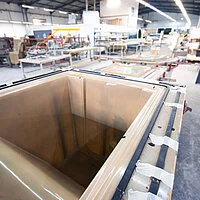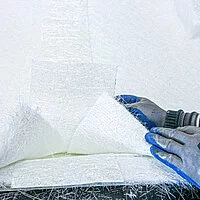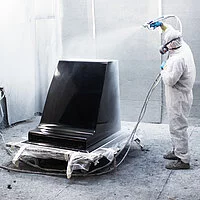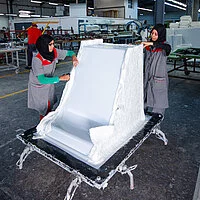Resin Transfer Molding is an advanced process for manufacturing components from fiber-reinforced plastics in large quantities. At C.F. Maier-TEC, we have specialized in the VA-RTM process, an innovative process that combines the advantages of the classic RTM process with the support of vacuum to efficiently produce complex geometries and high-quality components.
Resin Transfer Molding (RTM)





The RTM process
In the VA-RTM process (Vacuum-Assisted Resin Transfer Molding), special glass fiber mats are impregnated with synthetic resin in a two-part, closed mold. The process begins with the application of a surface gelcoat layer in the mold in order to achieve a high-quality surface finish. The glass fiber mats and any hard foam cores are then inserted as reinforcement. If required, additional inserts such as metal or wooden elements, cables or empty conduits are added to increase the functionality of the end product.
The resin is then introduced into the closed mold using an injection process and with the support of a vacuum. The vacuum ensures that the resin is evenly distributed in the mold and completely envelops the glass fibers, which ensures a microcellular structure of the rigid foam and thus a high component quality. The closed process offers precise control of the resin distribution and results in components with smooth surfaces on both sides.
The finished components are demolded after curing and can be further refined by CNC machining. The use of gelcoat ensures that additional painting is not absolutely necessary, as the surface quality is already very high. The precise tool definition also ensures exact surfaces and contours of the components.
Use of materials and areas of application
We only use polyester resin in the RTM process, as it is a cost-effective solution for a wide range of applications and also offers high strength and durability. The process is particularly suitable for applications that require large quantities and enables the production of large-area and highly deformed components.
A particular advantage of the RTM process is its ability to produce very large-area components. In our company, we have already manufactured components up to a size of 3.6 x 2.3 meters. In addition to flat components, complex geometries, such as highly deformed vehicle fronts for motorhomes, can also be realized, which means that there are virtually no limits to the design requirements of our customers.
The use of sandwich constructions can significantly improve the rigidity, thermal insulation and soundproofing of components. Rigid foam cores, which either consist of sheet material or are molded foam inserts, can be provided with different wall thicknesses and inserts as required. This allows additional functionalities such as the integration of cables or fastening points to be implemented, which significantly reduces assembly costs.
Advantages and limitations of the RTM process
The RTM process offers numerous advantages, particularly for the economical production of components in medium to high quantities. The tool costs are low for plastic tools, which allows the production of annual quantities from a few hundred to more than 10,000 parts. In addition, the precise control of the resin injection enables uniform material distribution and therefore excellent product quality.
A particular advantage of the process is the ability to produce components with a very high surface quality, which can be further processed on CNC systems without the need for additional surface treatment. In addition, the integration of inserts in sandwich components can lead to considerable savings in assembly costs.
The VA-RTM process is similar to the vacuum expansion process (VEX process), but differs in the injection process used, which does not require foaming of the resin. This enables more precise control over the component density and structure.
Summary of advantages
The RTM process offers the following advantages:
- Efficient production of components with complex geometries in medium to high quantities
- Low tooling costs due to the use of plastic molds
- Possibility of integrating inserts for additional functionality and reduced assembly costs
- Smooth surfaces on both sides thanks to the closed process and the use of gelcoat
- Suitable for large-surface components and highly deformed structures, such as vehicle fronts for motorhomes
- High rigidity, heat and sound insulation thanks to sandwich constructions
The RTM process is therefore an extremely versatile manufacturing process that is particularly suitable for demanding and large-area applications where quality, precision and cost efficiency are paramount.
Would you like to find out more?
Send us an email or use our contact form or use our matchmaker for partnership and cooperation inquiries: